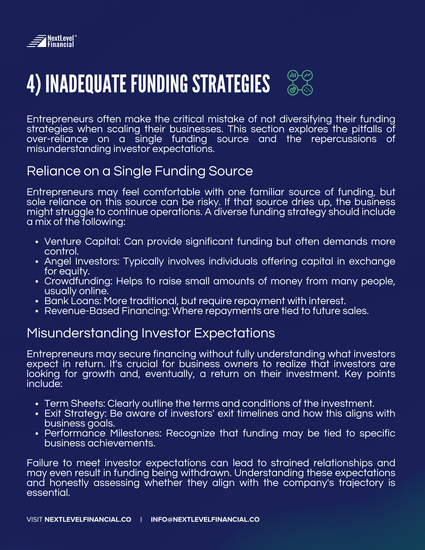
Entrepreneurs often embark on the journey of scaling their business with high expectations and the promise of increased profitability. However, amidst the enthusiasm, some fundamental financial mistakes are commonly overlooked, which can lead to significant setbacks. These errors, if not identified and addressed early, can impede a business's growth or, worse, lead to its downfall. Understanding these pitfalls is crucial for entrepreneurs who are in the process of expanding their operations.
One prevalent misstep is the lack of a solid financial foundation, highlighting the importance of budgeting and forecasting. Entrepreneurs sometimes fail to allocate financial resources appropriately, underestimating the costs associated with scaling. Investing heavily in new hires, marketing, or technology without a clear and realistic financial plan can result in a cash flow crisis. Additionally, as businesses grow, the complexity of managing finances increases. Being ill-prepared for such intricacies can prevent business owners from making informed decisions.
Another oversight is not securing adequate funding for expansion. Entrepreneurs tend to either underestimate the amount of capital required or overestimate their ability to generate revenue quickly. This leads to strained resources and may force a business to make compromises that can hinder long-term growth. Moreover, failing to anticipate market changes and not adapting financial strategies accordingly can leave a business vulnerable. Maintaining a balance between agility and foresight is essential as companies scale.
Undervaluing Financial Planning
Entrepreneurs often overlook the significance of robust financial planning, which is crucial for sustainable scaling.
Failing to Create a Scalable Financial Strategy
Entrepreneurs sometimes do not form a financial strategy that can adapt to increasing scale. They may initially succeed with ad hoc financial decisions, but as a business grows, this approach can lead to inefficiency and missed opportunities. A scalable financial strategy includes:
Developing a dynamic business model that can adjust to changes in market demand and operational scale.
Forecasting financial needs in advance to accommodate growth without overextending resources.
Neglecting Cash Flow Management
Effective cash flow management is vital for any scaling business. Neglecting it can lead to a situation where a business might appear profitable on paper yet encounter liquidity issues. Key aspects of cash flow management include:
Regularly updating cash flow projections to anticipate future inflows and outflows with precision.
Maintaining a cash reserve to cushion against unforeseen expenditures becomes increasingly important as the business expands.
Overlooking Critical Financial Metrics
When scaling a business, entrepreneurs often underemphasize the importance of critical financial metrics that are vital for sustainable growth.
Ignoring Unit Economics
Understanding the profitability of individual units sold is essential. Companies need to calculate the cost per acquisition (CPA) and the lifetime value (LTV) of a customer. Entrepreneurs should maintain a LTV to CPA ratio of at least 3:1 to ensure profitability.
CPA (Cost Per Acquisition)
Marketing Costs: Determining the cost it takes to acquire a single customer.
Sales Costs: Assessing how much the sales process adds to the overall CPA.
LTV (Lifetime Value)
Revenue: Projecting the total revenue a customer will generate over their lifespan.
Gross Margin: Estimating the profit margin after removing the cost of goods sold.
Not Monitoring Burn Rate
Monitoring burn rate—the rate at which a company consumes its capital—is a critical aspect of financial health. Entrepreneurs often underestimate the significance of their monthly expenses compared to the available capital.
Month | Monthly Expenses (USD) | Remaining Capital (USD) |
1 | 50,000 | 1,000,000 |
2 | 55,000 | 945,000 |
3 | 60,000 | 885,000 |
Companies should strive to have a clear plan for reaching break-even or securing the next round of funding before their capital runs dry.
Mismanaged Financial Growth
When entrepreneurs scale their businesses, mismanaged financial growth can lead to substantial problems. They must carefully balance expansion against the company's ability to sustain it.
Overexpansion of Operations
Entrepreneurs often increase their operations too rapidly, believing that the growth will automatically lead to increased profits. This can result in:
Cash Flow Challenges: Overexpansion can bring about cash flow issues, making it difficult to meet financial obligations such as payroll and supplier invoices.
Operational Inefficiencies: As the business grows, a lack of robust systems can reduce productivity and increase costs.
Inadequate Investment in Key Areas
Underinvestment in crucial business aspects can be equally damaging:
Technology: Failure to invest in the right technology can impede efficiency and scalability.
Talent: Not investing in skilled personnel can hinder optimal operation and innovation.
Inadequate Funding Strategies
Entrepreneurs often make the critical mistake of not diversifying their funding strategies when scaling their businesses. This section explores the pitfalls of over-reliance on a single funding source and the repercussions of misunderstanding investor expectations.
Reliance on a Single Funding Source
Entrepreneurs may feel comfortable with one familiar source of funding, but sole reliance on this source can be risky. If that source dries up, the business might struggle to continue operations. A diverse funding strategy should include a mix of the following:
Venture Capital: Can provide significant funding but often demands more control.
Angel Investors: Typically involves individuals offering capital in exchange for equity.
Crowdfunding: Helps to raise small amounts of money from many people, usually online.
Bank Loans: More traditional, but require repayment with interest.
Revenue-Based Financing: Where repayments are tied to future sales.
Misunderstanding Investor Expectations
Entrepreneurs may secure financing without fully understanding what investors expect in return. It's crucial for business owners to realize that investors are looking for growth and eventually, a return on their investment. Key points include:
Term Sheets: Clearly outline the terms and conditions of the investment.
Exit Strategy: Be aware of investors' exit timelines and how this aligns with business goals.
Performance Milestones: Recognize that funding may be tied to specific business achievements.
Failure to meet investor expectations can lead to strained relationships and may even result in funding being withdrawn. Understanding these expectations and honestly assessing whether they align with the company's trajectory is essential.
Poor Resource Allocation
Scaling a business requires meticulous planning, especially when it comes to resource allocation. Entrepreneurs often face challenges in optimizing the use and distribution of their resources during expansion, leading to potential financial setbacks.
Inefficient Capital Deployment
Inefficient capital deployment occurs when funds are not directed towards areas of the business that will yield the highest return on investment (ROI). Entrepreneurs may inaccurately forecast the demand for their products or services, leading to misallocated financial resources.
Marketing Overspend: Allocating too much money to marketing with poor ROI.
Underestimating Costs: Failing to anticipate the true costs of scaling operations can lead to a shortfall of funds.
Overextending Product Lines: Investing in too many new products without adequate research can dilate capital reserves.
Neglecting to Reinvest in the Business
A reluctance or oversight in reinvesting sufficiently back into the business can hamper growth and sustainability. Scaling requires investment in:
Technology: Upgrading systems that improve efficiency and capacity is crucial.
Personnel: Skilled employees drive innovation and manage increased operational demands.
Infrastructure: Physical and digital infrastructures must scale appropriately to support growth.
Not emphasizing these areas can lead to stagnation or even regression, as competitors who reinvest wisely may outpace those who do not.
Conclusion
As entrepreneurs embark on the journey of scaling their businesses, it is important to ensure that these fundamental financial mistakes are not overlooked. If not identified and addressed early, these pitfalls can impede a business's growth or, worse, lead to its failure.
Partnering with a fractional CFO can help prevent these mistakes and lead to a successful expansion of the business.
Are you in need of a CFO? We provide fractional, virtual CFO services! Book a discovery call with us today, and let's discuss how our team can help you scale your business.
Get Started: https://www.nextlevelfinancial.co/contact
At Next Level Financial, we're dedicated to helping you grow in a sustainable way. Let’s discuss how we can be a resource to you.
















Comments